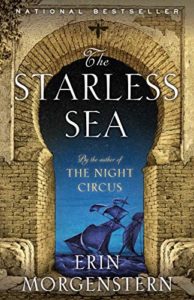 The Starless Sea, by Erin Morgenstern
The Starless Sea, by Erin Morgenstern
Synopsis: A college student find a portal to a magical, massive underground library, and finds his life is one of it’s stories.
Book Review: The most notable thing about this novel, and what you’re hit with as soon as you open the book, is the strength and scope of the structure play. The novel has framing stories within framing stories. It’s shot through with vignettes that turn into serial stories–basically fairy tale fables. They later co-mingle with other stories. Charecters swap between them, and enter the primary narrative that the protagonist inhabits. It’s really cool, and well done, and immediately reminded me of the best book ever written (Vellum).
Unlike Vellum, the story is pretty literal. You could unwind it and write a single, coherent story that goes from beginning to end. That makes it not quite as exciting, but it’s not really fair to compare anything to the best book ever written, so not a mark against Starless Sea. Because there is so much interweaving between the stories, and it can be unwound, as you’re reading along you begin to backfill details and characters. You realize the person in story B is the same person as story A, and that makes them the mother of charecter X, and the lover of character Y. It gives a jolt of pleasure every time another puzzle piece clicks together. This is probably what reading a mystery feels like, if you’re good at them. This is a book that was made to read twice, and the experience the second time will probably be very different from the first time.
Also, the fantastical underground is gorgeous and fascinating and I would love to be lost there for ages.
On the downside, not much happens in Starless Sea. The primary narrative is basically another one of the serial fairy tales that we get so many of, except examined in great detail. Unfortunately, there isn’t enough substance in a short fairy tale to support a novel’s worth of narrative. You can’t take a story that’s maybe a dozen pages in its fable form and draw it out to 300+ pages. Not only is there not enough of consequence that happens, but there’s very little of consequence at all. The stakes are… unknown? Whether the protagonist wins or loses doesn’t really matter, nothing really changes in the world, or even in anyone’s life. The non-magical real-world sections drag on for way too long. The magical world, while totally awesome, is a fairy tale and so the charecters are never plausibly in danger. The protagonist never has any agency, doing little besides choosing doors, which is fine for a fairy tale, but unsatisfying in a novel. In the end, it just didn’t feel like there was anything there.
It was an interesting reading experience, and I don’t regret reading this. I think I learned a bit about fiction, and the good parts are really good! But it’s just not something I’d be very enthusiastic about reading or recommending. So, Not Recommended.
Book Club Review: The structure play in the novel is quite fun to talk about, as is interogating why it feels well-written but insubstantial. And there is a certain type of reader who will absolutely fall in love with this sort of story. It may work for your book club, especially if you like slower, literary-style things. It doesn’t really have anything that’ll challenge reader’s assumptions or views, though. The discussion was alright, but a bit truncated. On balance, I think also Not Recommended, but it could work very well for some.